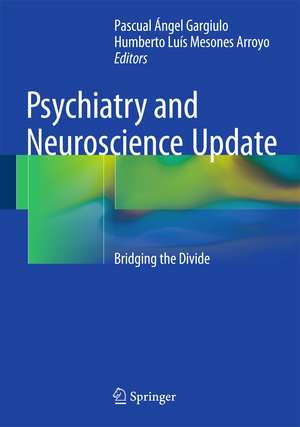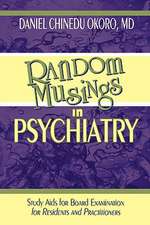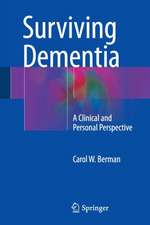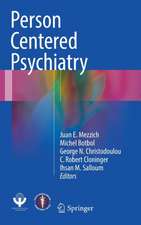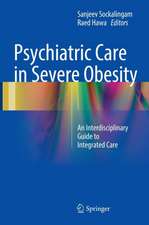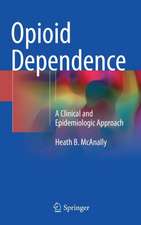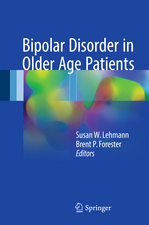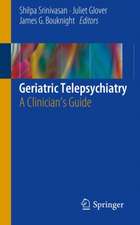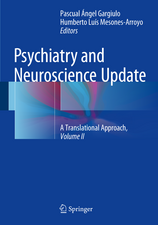Psychiatry and Neuroscience Update: Bridging the Divide
Editat de Pascual Ángel Gargiulo, Humberto Luis Mesones Arroyoen Limba Engleză Hardback – 23 oct 2015
| Toate formatele și edițiile | Preț | Express |
|---|---|---|
| Paperback (2) | 727.37 lei 38-44 zile | |
| Springer International Publishing – 23 aug 2016 | 727.37 lei 38-44 zile | |
| Springer International Publishing – 24 ian 2022 | 1320.72 lei 6-8 săpt. | |
| Hardback (2) | 1022.61 lei 38-44 zile | |
| Springer International Publishing – 24 ian 2021 | 1843.09 lei 3-5 săpt. | |
| Springer International Publishing – 23 oct 2015 | 1022.61 lei 38-44 zile |
Preț: 1022.61 lei
Preț vechi: 1076.43 lei
-5% Nou
Puncte Express: 1534
Preț estimativ în valută:
195.68€ • 204.72$ • 162.55£
195.68€ • 204.72$ • 162.55£
Carte tipărită la comandă
Livrare economică 29 martie-04 aprilie
Preluare comenzi: 021 569.72.76
Specificații
ISBN-13: 9783319171029
ISBN-10: 331917102X
Pagini: 638
Ilustrații: XXVIII, 434 p.
Dimensiuni: 178 x 254 x 2 mm
Greutate: 1.32 kg
Ediția:1st ed. 2015
Editura: Springer International Publishing
Colecția Springer
Locul publicării:Cham, Switzerland
ISBN-10: 331917102X
Pagini: 638
Ilustrații: XXVIII, 434 p.
Dimensiuni: 178 x 254 x 2 mm
Greutate: 1.32 kg
Ediția:1st ed. 2015
Editura: Springer International Publishing
Colecția Springer
Locul publicării:Cham, Switzerland
Public țintă
Professional/practitionerCuprins
PART 1: EPISTEMOLOGICAL CONSIDERATIONS ABOUT THE STUDY OF NORMAL AND ABNORMAL HUMAN BEHAVIORS.- 1. Knowledge, by Philosophy or Science? Psychotherapy or Neuroscience?.- 2. Phenomenology as an approach method in the Neurosciences.- 3. Trends in Philosophy of Mind and in Philosophy of Neuroscience.- 4. Neurosciences, Neuroeconomics, and Metaphysics.- 5. Towards a Psychotherapy with a Philosophical Basis.- 6. DSM5: A Bioethical Overview.- PART 2: FROM BASIC NEUROSCIENCES TO HUMAN BRAIN.- 7. Brain Renin-Angiotensin System: A Novel Therapeutic Target for Psychostimulant and Alcohol Related Disorders?.- 8. Role of the Neuropeptide Angiotensin II in Stress and Related Disorders.- 9. Neurovascular Cognitive Alterations: Implication of Brain Renin-Angiotensin System (Ras). Therapeutic Opportunities and Risk Factors.- 10. Prevention of Stress-Induced Cognitive Impairment: Today and Tomorrow.- 11. Circadian Synchronization of Cognitive Functions.- 12. The Role of Iron and Other Trace Elementson Mental Development and Cognitive Function.- 13. New Insights in Glutamate-Mediated Mechanisms Underlying Benzodiazepines Dependence and Cocaine Vulnerability.- 14. Soy and Psychotropic Effects: A Brief Overview.- 15. Use of Psychotropic Drugs: Between the Medicalization and Rationality.- PART 3: NEUROSCIENCES, LEARNING, TEACHING AND THE ROLE OF SOCIAL ENVIRONMENT.- 16. Learning Styles: From Basic Investigation to Learning in the Classroom.- 17. Learning Styles and Strategies: The Importance of the Tool Selection.- 18. Attentional Capacity in Children: Intervention Programmes for its Development.- 19. Social Representation and Imagery of Labor.- Evaluation Process of the Psychosocial and Labor Vulnerability (PSLV) and its Relation With Mental Health.- PART 4: EXPLAINING HUMAN PATHOLOGICAL BEHAVIORS: FROM BRAIN DISORDERS TO PSYCHOPATHOLOGY.- 20. The Ying and Yang of Pain: Protective vs. Damaging.- 21. Neuropsychological Disorders after Mild Traumatic Brain Injury or Concussion.- 22. Animal Models of psychopathology and its relation to clinical practice.- 23. Biological Markers in Psychiatry and its Relation with Translational Approaches: Brief Historical Review.- 24. ‘Two Hit’ Neurodevelopmental Mechanisms In Schizophrenia: Focus On Animal Models And The Role Of BDNF.- 25. Translating the Glutamatergic Hypothesis of Schizophrenia through Homeostatic Regulation of Brain Glycine.- 26. Adenosine in the neurobiology of schizophrenia: potential adenosine receptor-based pharmacotherapy.- 27. Mindfulness and Neuroimaging.- 28. Clinical Magnetic Resonance Neuroimaging in Mild Cognitive Impairment and Alzheimer´s Disease.
Recenzii
“This book, written by international experts, attempts to bridge the gap between neuroscience and psychiatry and is a outstanding contribution to the scientific literature. … The intended audience … includes psychiatrists, psychologists, philosophers of science, neuroscientists, neurologists, bioethicists, and anyone interested in this intriguing field. … This is an excellent and informative book on an important problem in the integration of the various levels of explanation in the neurosciences.” (Michael Joel Schrift, Doody's Book Reviews, February, 2016)
Notă biografică
Pascual Ángel Gargiulo, PhD
Specialist in Psychiatry
Professor of Psychopathology
Catholic University of Argentina
Head
Laboratory of Neurosciences and Experimental Psychology
National Council of Scientific and Technical Research (CONICET)
Professor of Pharmacology
National University of Cuyo
Mendoza, Argentina
Humberto Luís Mesones-Arroyo, M.D., DPM
Psychiatrist by University Complutense of Madrid and University of Buenos Aires
Former Director of National Institute of Mental Health (Argentina).
Member of the Council of the Institute of Neurobiology (Buenos Aires)
Member of the Board of Certification, National Academy of Medicine (Argentina)
Buenos Aires, Argentina
Specialist in Psychiatry
Professor of Psychopathology
Catholic University of Argentina
Head
Laboratory of Neurosciences and Experimental Psychology
National Council of Scientific and Technical Research (CONICET)
Professor of Pharmacology
National University of Cuyo
Mendoza, Argentina
Humberto Luís Mesones-Arroyo, M.D., DPM
Psychiatrist by University Complutense of Madrid and University of Buenos Aires
Former Director of National Institute of Mental Health (Argentina).
Member of the Council of the Institute of Neurobiology (Buenos Aires)
Member of the Board of Certification, National Academy of Medicine (Argentina)
Buenos Aires, Argentina
Textul de pe ultima copertă
The intention of this unique title is to bridge the gap between psychiatry and neuroscience, allowing a fruitful dialogue between both sciences. Recognizing that psychiatry has received important contributions from the basic neurosciences, and that the basic neurosciences have received inspiration and objectives from the open problems of psychiatry, Psychiatry and Neuroscience: Bridging the Divide is designed to identify the borders, trends and implications in both fields today. Comprehensive and developed by a renowned group of experts from both fields, the book is divided into four parts: Epistemological Considerations About the Study of Normal and Abnormal Human Behaviors; From Basic Neurosciences to Human Brain; Neurosciences, Learning, Teaching and the Role of Social Environment; and Explaining Human Pathological Behaviors: From Brain Disorders to Psychopathology. A unique and invaluable addition to the literature in psychiatry and neuroscience, Psychiatry and Neuroscience: Bridging the Divide offers an important and clearer understanding of the relationship between psychiatry and neuroscience.
Caracteristici
Synthesis of basic research, preclinical and clinical practice of psychiatry Contributes to the important task of bridging key conceptual issues between neuroscience and psychiatry Authored by renowned experts in the field
